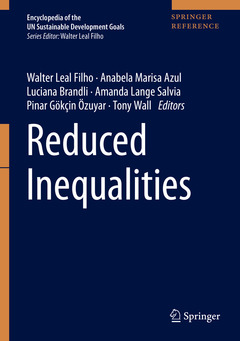Reduced Inequalities, 1st ed. 2021 Encyclopedia of the UN Sustainable Development Goals Series
Coordonnateurs : Leal Filho Walter, Azul Anabela Marisa, Brandli Luciana, Lange Salvia Amanda, Özuyar Pinar Gökcin, Wall Tony

Concretely, the identified targets are:
- Progressively achieve and sustain income growth of the bottom 40 per cent of the population at a rate higher than the national average
- Empower and promote the social, economic and political inclusion of all, irrespective of age, sex, disability, race, ethnicity, origin, religion or economic or other status
- Ensure equal opportunity and reduce inequalities of outcome, including by eliminating discriminatory laws, policies and practices and promoting appropriate legislation, policies and action in this regard
- Adopt policies, especially fiscal, wage and social protection policies, and progressively achieve greater equality
- Improve the regulation and monitoring of global financial markets and institutions and strengthen the implementation of such regulations
- Ensure enhanced representation and voice for developing countries in decision-making in global international economic and financial institutions in order to deliver more effective, credible, accountable and legitimate institutions
- Facilitate orderly, safe, regular and responsible migration and mobility of people, including through the implementation of planned and well-managed migration policies
- Implement the principle of special and differential treatment for developing countries, in particular least developed countries, in accordance with World Trade Organization agreements
- Encourage official development assistance and financial flows, including foreign direct investment, to states where the need is greatest, in particular least developed countries, African countries, small island developing states and landlocked developing countries, in accordance with their national plans and programmes
- Reduce to less than 3 per cent the transaction costs of migrant remittances and eliminate remittance corridors with costs higher than 5 per cent
Walter Leal Filho (BSc, PhD, DSc, DPhil, DEd, DL, DLitt) is a Senior Professor and Head of the Research and Transfer Centre "Sustainable Development and Climate Change Management” at Hamburg University of Applied Sciences in Germany, and Chair of Environment and Technology at Manchester Metropolitan University, UK. He is the initiator of the Word Sustainable Development Symposia (WSSD-U) series, and chairs the Inter-University Sustainable Development Research Programme. Professor Leal Filho has written, co-written, edited or co-edited more than 400 publications, including books, book chapters and papers in refereed journals.
Anabela Marisa Azul is a Researcher at the Center for Neuroscience and Cell Biology (CNC) and the Institute for Interdisciplinary Research of the University of Coimbra (UC, Portugal). She holds a Ph.D. in Biological Sciences, specializing in Ecology (2002, UC), and pursued her investigation on biology and ecology of fungi to pinpoint the role of mycorrhizal symbiosis for sustainability of Mediterranean forests under different land use scenarios at the Centre for Functional Ecology (CFE-UC), where she became an Associate Researcher (from 2009 to 2014). At CFE-UC, Marisa Azul developed a holistic approach that combined innovation in food production with sustainable development and public scientific awareness to multiple actors. At CNC, from 2014 on, Marisa Azul focuses her investigation on basic research and participatory research dynamics to pinpoint links between metabolism, health/disease, and sustainability. She has broad academic experience as a researcher working in participatory research and interdisciplinary that link biomedical and life/environmental sciences, social sciences, science education, science communication, and artistic forms. Her research interests also lie in bringing together the academy and social/economical players. She has been successful in attracting national and international fund
Date de parution : 08-2021
Ouvrage de 924 p.
17.8x25.4 cm
Thèmes de Reduced Inequalities :
Mots-clés :
Sustainability; Nutrition; Innovation; Diseases; Sustainable Development; Research
